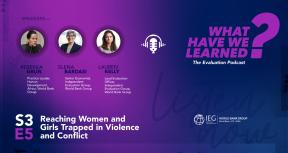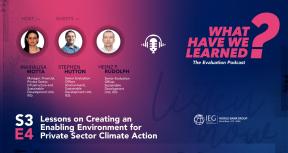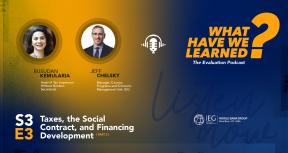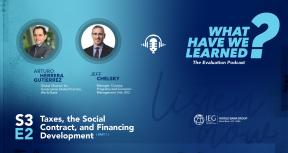|
Speaker
|
|
|
JEFF CHELSKY
|
Hello and welcome to what we have learned? A podcast where we reflect on the lessons learned from tackling today's most pressing development challenges. I'm your host, Jeff Chelsky from the World Bank's Independent Evaluation Group, IEG.
In today's episode, we'll be focusing on the millions of people who rely on natural resources for their livelihoods and well- being. And how climate change is accelerating the degradation of natural resources, putting whole communities at risk.
We'll be looking at what we've learned from the efforts of the World Bank Group and other development actors to support the preservation and management of natural resources.
I'm joined today by my colleague Lauren Kelly, of the Independent Evaluation Group in Washington DC, and Oumou Moumouni, of the UN Office for the Coordination of Humanitarian Affairs UN OCHA, joining us from Niamey Niger.
Lauren, you co-authored a recent report focused on the World Bank Group's efforts to support the management of natural resources. Let me start off with two very basic questions:
Who should care about natural resource degradation in developing economies and why should they care?
|
|
LAUREN KELLY
|
Hi Jeff, thanks for having me today.
Let me get started. We are living through unprecedented times. We are living through the coronavirus and even prior to the coronavirus, what we know is that over half a billion people were already living in extreme poverty.
Those numbers, through the coronavirus, through the pandemic, are growing. But what we already know is that half a billion people were living in extreme poverty and these people, who often live in rural areas, depend on natural resources for their very survival.
And this is an important reason why we in IEG focused on the issue of natural resource degradation and human vulnerability.
Let me just give you a couple of figures to paint a better picture here. You know almost one third of all arable land, the land that we use for farming, is degraded and it's getting worse, and so farming and food security issues are at the fore.
A fifth of all our forest cover that all of us use, but that the poor especially used for fuel wood, for energy, for cooking, etc, is severely degraded, and this is getting worse.
Groundwater, which we use for drinking and for irrigating our farms is being depleted at a rapid clip.
So it's really critical to understand that yes, resources are being degraded, but when we look ahead in the future, the lives and welfare of the most extreme poor will be severely impacted. Their very survival is at stake here.
So who should care about this?
We should all care because we'll all suffer from the global depletion of resources. But those of us working on eradicating poverty need to pay special attention because the poor will suffer disproportionately and because well managed resources underpin all the work that we're trying to do to help our clients grow in a sustainable and inclusive way.
And lastly I'd say, this is critically important that we talk about this because those people that stand to lose the most, those extreme poor that depend on natural resources, they don't have a voice or a platform in which to express that voice to report about what's happening on the ground and the ways they're losing out and suffering even more, both from the degradation that occurs and the effects that climate change is having on them.
They also lack decision making power. So even when they can have a voice or have access to a platform that we provide, they often lack decision making power to change the way that resources are being allocated or misused.
So, in a nutshell, we all should care and in action has a huge amount of costs.
|
|
JEFF CHELSKY
|
A major part of your report focuses on the Great Green Wall. Can you explain to me what is the Great Green Wall and why is it important?
|
|
LAUREN KELLY
|
Decades ago, many heads of African States decided to lend their support to develop a virtual wall. A great green wall. A large belt of trees that would stretch across 12 states of the Sahel. And they did this for a couple of reasons, but primarily it was to stop desertification. They thought: the land is being degraded if we can only get those trees rooted in the soil, we can stop soil degradation.
Over time they also realized that planting those trees and greening the Sahel would have a lot of development benefits: trees bring water, soil becomes more fertile, we can farm that soil, and there's many more economic activities that can evolve from this belt of trees.
We've supported it in the World Bank. Many donors have supported it. We put a lot of technical assistance and financial support into the great Green Wall. We put over a billion dollars into it so far, and IEG has done quite a bit of evaluation in this space. So we have a few findings and I can move you through those now.
So you're in the Sahel, you know, you see this great green wall of trees and that's the good news. A lot of the work we've been doing to support the development of this wall of trees has worked. From a technical perspective, we use satellite imagery and drone footage, we can see that a lot of the technical intentions were successful. The area is greener, land has been rehabilitated, there's been a lot of work provided for a lot of folks that live in and around this area, and that has resulted in a lot of environmental benefits. Economic benefits as well in terms of ability to farm and use that land more productively.
But there's a few things we need to focus on going forward, and this is what we what we say in our report.
One is that we really have to better understand what works. For example, we don't measure the effect of rainfall on these interventions, so we know that we've done a lot of work to help plant those trees and support those trees to maturity to help them to grow and be sustained. But what we don't know is what is the exact impact of rainfall because we know there's been a lot more rainfall in the Sahel over the last decade, but we don't measure that. So it's really important we understand what part intervention, what part technical and frankly, what part rain?
The other thing we really need to grapple with is how decision-making changes. Imagine you're in a degraded land and a decade later you're living in a land this fertile with a great green wall of trees and a lot of economic potential. What happens in areas like this, and it's a bit of a victim of our own success, is that when we add a lot of value to degraded land, the decision calculation changes.
What that means is that degraded land, which is really important for a lot of very vulnerable resource dependent people - for grazing, access to fodder, access to lot of the sort of goods that exist in degraded lands - what happens is the decision calculus changes and that land becomes very attractive to folks.
We found in our evaluations that when lands become more valuable that there can be predation of that land, that promises that were made to communities that live on that land get broken, and that sometimes that land can be sold away from those communities.
So what does that mean?
That means that we can have very good technical success in areas where we are trying to rehabilitate degraded land, but we have to be very vigilant about the rights and ability of those communities whom we're serving to be able to continue to access and use that land when it becomes more valuable.
|
|
JEFF CHELSKY
|
Great thanks Lauren. Let me let me turn to Oumou who's on the front lines of this issue. Oumou, you work closely with communities in Niger in your role as Humanitarian Affairs officer at UNOCHA, can you tell us a bit about the impact of natural resource degradation on local communities from where you stand? For example, do women face particular challenges? What is it that you see on a day-to-day basis?
|
|
OUMOU MOUMOUNI
|
Thank you, Jeff, for inviting me. It will be a real pleasure for me to share with you my experience in the field.
In Niger, we have different subgroups of women within the society itself and each subgroup has different rights and roles that determine whether they are able to participate in activities such as climate project activities and benefit from these projects. For example, two aspects prevent women's participation in programs such as cash-for-work programs.
First, society is dominated by a patriarchal system, which means that some women need a husband's or father's permission for them to participate, and second, the cultural aspect that makes it inappropriate for a woman to participate in power activities that tend to be assigned to men. As for married women, they do not have enough time to participate in these programs because of domestic duties unless this aspect is taken into account in the program design.
Also, women are disproportionately affected by land management practices such as enclosures that have been put in place to protect restored sites.
In Niger, male migration is very high, especially in rural areas. Thus, women who remain in the villages after their husbands or fathers have left, depend on degraded land or grasslands for their family's survival. In these areas, women collect wood for cooking, medicinal plants, and herbs and fodder for animals. Thus, when the project sets up enclosures to support reforestation and regeneration, it severely restricts the access of women and other resource users to this survival asset.
Thus, not taking these aspects and differences into account in the design and implementation of climate adaptation projects could prevent entire subgroups of resource users from benefiting from the program or, worse, aggravate their already existing vulnerability.
|
|
JEFF CHELSKY
|
This this sounds almost like a catch-22, so if women are not married then they can't get permission to participate in the programs. If they are married, they're too busy with household responsibilities to participate in the program.
In a situation like that, what would you look to the World Bank, or institutions like the World Bank, to provide in order to help address the impact of natural resource degradation and meet the needs of women specifically? What would you like to see the World Bank do to help address the catch-22 you described with both single and married women.
|
|
LAUREN KELLY
|
First, during the interviews some women asked the World Bank to find ways to create more mitigated work programs, more appropriate for them in terms of balancing the needs of married women. For example, to take into consideration the fact that they need to stay close to home to be able to do household tasks, but also to find ways to do their homework or something that they can do to benefit from these programs as well.
Another aspect to consider when designing climate projects is the birth rate in Niger, which is one of the highest in the world. Women have an average of seven children and some have more. Programs really need to take into account the role of women when addressing the participation issues mentioned before.
Finally, it is important that the World Bank and its partners really understand the culture and responsibilities of women in society in these areas before designing these kinds of programs.
|
|
JEFF CHELSKY
|
Very, very interesting.
Lauren, let's turn to your report, which has got a very long title, so bear with me.
It's the Natural Resource Degradation and Human Vulnerability Nexus: An Evaluation of the World Bank Support for Sustainable and Inclusive Natural Resource Management 2009 - 2019. Did I get that correct?
|
|
LAUREN KELLY
|
Keep going, yeah, that's good.
|
|
JEFF CHELSKY
|
In plain language, what did you learn in your report and how is the World Bank doing? What should it be doing?
|
|
LAUREN KELLY
|
Overall, we found that the World Bank is doing a lot of the right things in the right places. So, it is identifying and addressing a lot of the forest, soil, and land degradation issues globally. It's identifying those issues where those issues are happening. And it's been broadly effective at improving natural resource management practices, helping farmers and helping resource users to do the right thing to use those resources better.
But a few things need attention.
So number one, we need to understand that extremely poor resource dependent people are not a homogeneous group. There are many different uses of resources that sometimes can compete for those resource users. But they all need our attention, and so one of the things we found is that there's a need upfront ex ante to really think about who are these users, what are their needs, how are they synergistic and how they compete, and what can we do about them. So not everyone's a farmer, to put it bluntly.
The second thing we found is that the gap really extends to the need to better analyze and assess the plight of resource dependent persons, how and why they're vulnerable to this resource degradation issues.
What we'd like to see is a lot more diagnostics on the livelihood issues, welfare and income, and links to health and welfare that are derived from the management of these resources.
We do a really good job at understanding the resources themselves, but we need to do better at understanding the contribution of natural resources to income and livelihoods for the rural poor and what's going to happen as these resources become depleted to those livelihoods, welfare and income and also to people’s health. We need to do a lot more upstream on that because the situation is getting worse.
Finally, I'd say on gender: Oumou has talked a lot about the plight of women. They are on the frontlines; they are the ones that are really suffering from resource depletion because their livelihoods depend on it so much. We went to some areas where women’s only livelihood, and this again is in the Sahel, really depends on the collection of nuts of firewood, grasses that they sell to herders. So, when these are depleted their lives are really in a precarious state.
The World Bank does focus on gender, but what I think we can do better is really looking at the relationship between gender and gender related resource rights. And use rights. What resources do women have access to and what rights do they have to use them? You know, including using them and selling them. So there's a lot of different resource rights that are embedded in this in this area, and gender is a key thing to look at when it comes to inequality and poverty. Thanks, Jeff.
|
|
JEFF CHELSKY
|
Many of the issues we've talked about during this episode are going to be central themes in the 26th meeting of the UN Climate Change Conference AKA COP 26.
Lauren, what in your report is relevant to COP26, and how do you think its findings should feed into the discussion?
|
|
LAUREN KELLY
|
Everyone is excited about Glasgow and everyone is excited that, the World Bank Group has adopted a new climate change action plan, and that we are all now moving in the right direction with regard to really adopting the principles of the Paris Agreement. And so this report is so important because it helps us understand how clients can achieve the Paris Agreement in the area of adaptation.
So the first principle of our report says that as we move towards Glasgow and the COP, that the vulnerability of resource dependent peoples has to be at the center of this discussion of climate change adaptation.
And the kind of solutions that we propose to achieve our climate change goals have to be solutions that make sure that there is a win win. They have to be solutions that say we are going to reduce the vulnerability of resource dependent people through environmental management that also then allows us to achieve our climate change goals.
By putting vulnerability at the center of this and understanding the context in which the extreme poor who depend on resources suffer, we can then design programs that are both culturally and economically appropriate for the people that are suffering from climate change.
So what do I mean by that? what we find is that we need a lot more voice from people that are on the front lines that are suffering from the effects of climate change. The extreme poor that are also dependent on natural resources.
There needs to be a lot more indigenous knowledge and there needs a lot more input into these solutions into adaptation programs so that we can build these programs in a more sensible way in a more appropriate way that get those wind wins.
|
|
JEFF CHELSKY
|
COP 26 has a fairly crowded agenda. So how optimistic are you that issues like the ones you've raised are going to get a hearing?
|
|
LAUREN KELLY
|
The COP26 has put adaptation squarely on the agenda and they have included new elements and dimensions of adaptation under the Paris Agreement, this is Article 7. So we know that adaptation is going to be at the front and center of this discussion.
The real question is how much will this conversation, this dialogue, include those voices? How much will we really speak to the need to address vulnerability front and center when we're designing more adaptive capacity and resilient approach approaches.
The projects that we evaluated are all climate adaptation projects. They are all projects where the World Bank Group tried to, and in many times very successfully, tried to reduce resource degradation for the benefits of the poor. But the learning occurs within those projects on how we do it right.
For example, Oumou just talked about enclosures. What we really need to do is have a dialogue on how we're going to support these adaptive approaches. If we talk about enclosures, what we're saying is this: If one technical response in climate adaptation projects is to enclose land and resources to allow them to rehabilitate and get those climate change goals met, then we also have to think about what we do in the short to medium term for those resource users that may become more vulnerable because we use that technique.
So in those kinds of programs, we would, at the same time, think about how we compensate resource users from the limits that we've created, how we help them to adapt to those new resource rules and uses, as we move more towards rehabilitating land and resources so that they can be more productive over time.
So I think the devil is in the details. The devil is in how we build the programs, not whether we should.
|
|
JEFF CHELSKY
|
Now, regrettably, I believe we have come to the end of our time. I'm glad we've had the opportunity to look closely at the relationship between people and natural resources, which they depend on for their very survival.
There's no straightforward answers to restoring and protecting natural resources. And even those answers seem to come with their own challenges. What is clear, however, is that understanding and taking into account the needs of resource dependent communities has to be central to all efforts.
This is just one of the lessons from Lauren’s report on natural resource degradation.
So I'd like to thank Lauren and Oumou for sharing their insights and experience with us today. For those who would like to get to know more about this topic, you can find the report on IEG's website.
In future podcasts we'll be discussing development challenges that range from aging populations to managing fiscal and financial sector vulnerabilities to food security and developing economies.
I'd like to thank you all for joining us. Please stay safe and healthy wherever you are. Thank you very much and have a good day.
|









